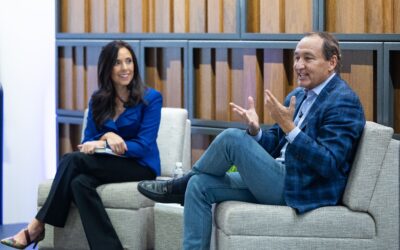Diversity, Equity, Inclusion, and Belonging (DEIB) initiatives surged after George Floyd’s murder, aiming to tackle systemic problems. But progress is stalling. The elimination of nearly 30% of Chief Diversity Officer roles exposes a worrying trend: DEIB efforts remain bolted-on, not built-in.
We spoke with 4 different Latino DEIB leaders, all LLI graduates, about their thoughts on the past and future of this work.
Gen-Z’s Drive for Workplace Equity Gives Me Hope for DEIB’s Future
 “DEIB tempers the waves of social change. Values like respect, inclusion, and being heard drive discussions that are the heartbeat of new organizational discussions surrounding psychological safety. These conversations underscore the continuous evolution of DEIB efforts, emphasizing its enduring significance. DEIB isn’t going anywhere. Rather, it’s steering the ship on how our workplaces navigate current events and shape workplace culture as we know it. I remain optimistic about the future of DEIB because I believe Gen-Z has the tenacity, perseverance, and stamina needed to demand workplace equity that employees need to be innovative, motivated, engaged, and thriving.”
“DEIB tempers the waves of social change. Values like respect, inclusion, and being heard drive discussions that are the heartbeat of new organizational discussions surrounding psychological safety. These conversations underscore the continuous evolution of DEIB efforts, emphasizing its enduring significance. DEIB isn’t going anywhere. Rather, it’s steering the ship on how our workplaces navigate current events and shape workplace culture as we know it. I remain optimistic about the future of DEIB because I believe Gen-Z has the tenacity, perseverance, and stamina needed to demand workplace equity that employees need to be innovative, motivated, engaged, and thriving.”
Arely Garcia
Director of Diversity, Equity and Inclusion
FoodCorps
LLI Graduate
LinkedIn
Zoom Out:
83% of Gen Z and 80% of Millennial candidates consider an employer’s commitment to diversity and inclusion important when choosing where to work.
For DEIB To Remain a Priority, It Must Be Driven From the C-Suite
 “In the next decade, organizations will face ongoing challenges in implementing DEIB programs. Some may choose to withdraw completely and eliminate related positions and departments, while others will double down and work towards eliminating disparities. The crucial factor will be the leadership within these organizations. For DEIB to remain a priority, it must be driven from the top-down, as efforts solely from the bottom-up encounter barriers that can only be removed with commitment from C-Suite leaders. Additionally, the workforce will continue to grow more diverse, and younger generations are demanding real commitment to DEIB from their employers. The competition for diverse talent will intensify, leaving organizations without an inclusive and belonging-focused plan behind.”
“In the next decade, organizations will face ongoing challenges in implementing DEIB programs. Some may choose to withdraw completely and eliminate related positions and departments, while others will double down and work towards eliminating disparities. The crucial factor will be the leadership within these organizations. For DEIB to remain a priority, it must be driven from the top-down, as efforts solely from the bottom-up encounter barriers that can only be removed with commitment from C-Suite leaders. Additionally, the workforce will continue to grow more diverse, and younger generations are demanding real commitment to DEIB from their employers. The competition for diverse talent will intensify, leaving organizations without an inclusive and belonging-focused plan behind.”
Jorge Avendano-Curiel
Chief Diversity, Equity, & Inclusion Officer
Denver Health
LLI Graduate
LinkedIn, Learn More
Zoom Out:
Companies with the most ethnically diverse executive teams see a 33% profitability advantage.
Systemic Problems Require More Than Band-Aid Solutions
 “Rushing to put a band-aid on centuries of systematic racism did not and has not gotten to the core of solving the problems that lead to inequity. Looking ahead, we’re already experiencing a shift in the political climate, with DEIB becoming weaponized and politicized. We need to address the centuries of caste in this country that feeds into how our workforce is represented at senior leadership levels. Until we recognize the value of diverse lived experiences, we will continue to go in circles in this space.”
“Rushing to put a band-aid on centuries of systematic racism did not and has not gotten to the core of solving the problems that lead to inequity. Looking ahead, we’re already experiencing a shift in the political climate, with DEIB becoming weaponized and politicized. We need to address the centuries of caste in this country that feeds into how our workforce is represented at senior leadership levels. Until we recognize the value of diverse lived experiences, we will continue to go in circles in this space.”
Aurora Elicerio
Sr. Manager, Talent Management & DE&I
Comcast / Talent / West Division
LLI Graduate
LinkedIn
Zoom Out:
DEI jobs experienced a 5% decline in early 2023 and have continued to shrink by 8% so far in 2024.
We Knew This Wouldn’t Be Easy, but We Can’t Give Up Now
 “The last decade has brought tremendous growth and awareness of DEIB; however, it’s occurred with varying levels of commitment and questionable motivations. Business articles, academic research, books, high-profile social movements and, unfortunately, tragedies, have all contributed to organizational tolerance because it has often been tied to return on investment (ROI) rather than morality and dignity. Unfortunately, I fear that DEI practitioners, allies, and advocates are going to have to withstand political pressures and prove the ROI. Nevertheless, none of us entered this field because it was easy, and we have to remain resolute.”
“The last decade has brought tremendous growth and awareness of DEIB; however, it’s occurred with varying levels of commitment and questionable motivations. Business articles, academic research, books, high-profile social movements and, unfortunately, tragedies, have all contributed to organizational tolerance because it has often been tied to return on investment (ROI) rather than morality and dignity. Unfortunately, I fear that DEI practitioners, allies, and advocates are going to have to withstand political pressures and prove the ROI. Nevertheless, none of us entered this field because it was easy, and we have to remain resolute.”
Matt Rivera
Director of Community Safety and Well-being
Adams County Government
LLI Graduate
LinkedIn
Zoom Out:
Exploring the struggles of DEIB leaders: Are they the modern Sisyphus? Read more.
In Conclusion:
During a time when some organizations are giving up on efforts, decisive leadership in DEIB is now more important than ever. Short-term investment will not lead to lasting change. Instead, the current and future workforce requires the courage and commitment of leadership to persist, both within and beyond organizations, and to continue investing in this vital and transformative work.



